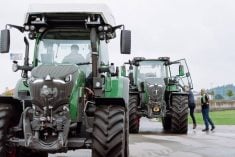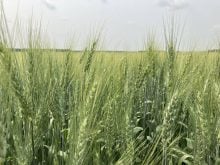The Organic Crop Improvement Association Research and Education board has named Danny Rempel of Hodgeville, Sask., this year’s outstanding organic farmer.
OCIA is one of the world’s foremost organic certifiers, with offices in Canada, the United States, Latin America and Japan.
The OCIA RnE is a not-for-profit organization that supports farmer driven research, professional development for organic producers and education on the benefits of organic farming.
The award, which is open to farmers from more than 20 chapters in the United States, nine in Canada and five in Latin America, has been presented to a farmer from the Canadian Prairies in four of the last five years. This attests to the leadership and excellence of prairie organic farmers.
Read Also

Why feds imposed EV tariffs
Moe and Kinew have a fight on their hands when it comes to eliminating the EV tariff. Canada has to worry about pissing off the U.S. and Mexico and hundreds of thousands of auto workers.
Rempel’s 1,400 acre farm has been certified organic since 1990. He has grown spring wheat, flax, lentils, feed oats, feed barley, green peas, chickpeas, soybeans, industrial hemp, yellow sweet clover, forage peas, alfalfa and grass. Not all have been successful, but Rempel continues to experiment.
His rotation generally starts with a green manure, often a legume intercropped with oats. The legume adds nitrogen and the oats add biomass and sequester carbon.
He usually follows the green manure with flax, lentils and a cereal. The cereal may be underseeded to sweet clover used as hay or as plow-down in the following year.
The rotation includes crops that can be seeded at different times: lentils early and flax and cereal a bit later. This helps to break weed cycles because some weeds grow early and some don’t start until later. It also helps control insects that are crop specific because the crop is always changing.
Livestock are an important part of the farm. Rempel has about 55 Charolais, Maine-Anjou, Red Angus cross beef cattle.
He raises the calves to slaughter weight and sells them as grain fed certified organic beef.
“I feel that the cattle fit into the farming system by allowing us to either graze or bale areas where we have weed problems” Rempel said.
“We also feed the screenings we get from cleaning our grain. We save and feed the chaff from behind the combine. This also eliminates a lot of weed seeds from the field. The manure is aged and then spread back on the land. This provides nutrients for future crops.”
The Rempels have also raised organic free range chickens, as well as pigs in a hoop shelter with a dirt floor and straw bedding.
Encouraging diversity is important to Rempel. He maintains a 28 foot buffer strip of grass around the perimeter of the farm, and has planted more than eight kilometres of shelter belt trees.
This and a diversity of annual and perennial crops encourages wildlife such as deer, antelope, moose, coyotes, foxes, rabbits and a variety of birds that shelter in the trees and eat insects in the fields.
The Rempels have also seen the endangered burrowing owl on the farm. Rempel has been active in his local community and in the organic community.
“It has been great to see the organic industry grow over the last 19 years that we have been involved,” said Rempel, who has been involved in OCIA Chapter 8 since its inception.
To help that growth, he has hosted field days and chapter meetings, and acted as a delegate to OCIA meetings.
He has also hosted research trials on his land, examining seeding rates in flax.
Rempel’s land was homesteaded by his great-grandfather in 1907 and has been in the family since. His 21-year-old son, Bryce, has moved back to the farm, with hopes of continuing the farming tradition.
Congratulations Danny, and may the farm continue to thrive under Rempel stewardship.
Brenda Frick is affiliated with the Organic Agriculture Centre of Canada and co-ordinator of organic research and extension at the University of Saskatchewan. Contact: organic@usask.ca.















